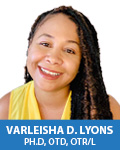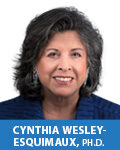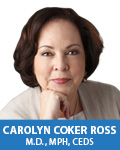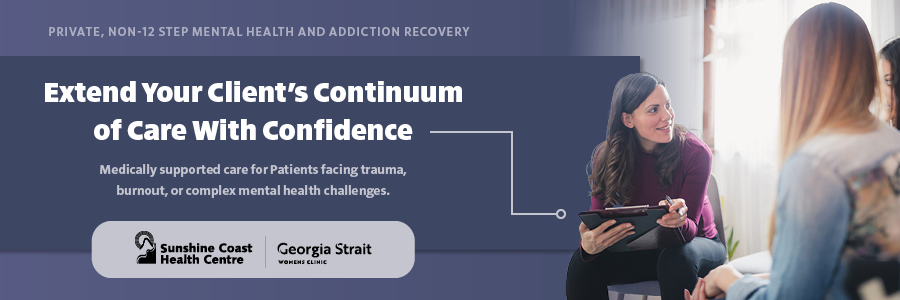 Important Notice:
Important Notice:
The speaker lineup has been revised from prior marketing materials. This website contains the most accurate and current schedule as of October 9, 2025.
Presented by Cynthia Wesley-Esquimaux, Ph.D. and Varleisha D. Lyons, Ph.D, OTD, OTR/L and Carolyn Coker Ross, M.D.
Monday, December 8, 2025 – Wednesday, December 10, 2025 | Richmond, bc
The speaker lineup has been revised from prior marketing materials. This website contains the most accurate and current schedule as of October 9, 2025.
Monday, December 8, 2025 – Wednesday, December 10, 2025
8:30am – 4:00pm
Executive Hotel Vancouver Airport
7311 Westminster Hwy
Richmond, BC V6X 1A3
phone: 604.278.5555
Education and Clinical Professionals: K–12 Classroom Teachers, School Counsellors/Psychologists, Learning Assistance/ Resource Teachers, School Administrators, School Paraprofessionals including Special Education Assistants, Classroom Assistants and Childcare Workers. All other professionals who support students including but not limited to: Nurses, Social Workers, Psychologists, Clinical Counsellors, Family Therapists, Occupational Therapists, Speech Language Pathologists, Addiction Counsellors, Youth Workers, Mental Health Workers, Probation Officers, Police Officers, and Early Childhood Educators.
Parents, Caregiver, Foster Parents, Grandparents, and Extended Family raising a child.
8:30am - 4:00pm December 8, 2025
COURSE DESCRIPTION
This workshop offers educators a transformative opportunity to explore the intersection of trauma and spirituality within Indigenous communities, focusing on the impact of intergenerational trauma and how cultural wisdom can support resilience and well-being. By examining both traditional and contemporary healing practices, participants will deepen their understanding of how Indigenous spirituality, storytelling, and community-centered approaches can foster healing, restore balance, and strengthen the individual and collective health of students and families.
Indigenous communities have long faced the repercussions of colonization, forced assimilation, and systemic violence. These traumas have been passed down through generations, affecting the mental, emotional, and social well-being of individuals, families, and communities. Yet, alongside these challenges, Indigenous cultures possess profound spiritual traditions and healing practices that have endured. These practices remain a vital source of identity, resilience, and recovery, offering pathways to healing for those impacted by trauma.
This workshop is designed to empower educators and other professionals working in or with Indigenous communities. Participants will learn culturally grounded approaches to support healing in educational settings, incorporating Indigenous spiritual traditions, cultural practices, and storytelling to enhance student well-being and academic success. The workshop will also provide practical tools for integrating these healing methods into classroom teaching, school activities, and community-based programs.
Through engaging hands-on activities and thoughtful discussion, participants will gain the knowledge and skills to create healing environments that acknowledge and address the wounds of the past while fostering hope, empowerment, and community revitalization.
LEARNING OBJECTIVES

Varleisha D. Lyons Ph.D, OTD, OTR/L is a renowned occupational therapist, author, and speaker who is deeply passionate about promoting culturally intelligent and spiritually centered mental health care. As a woman of African American and Native American heritage, with ancestral ties…
8:30am - 4:00pm December 9, 2025
COURSE DESCRIPTION
This one-day workshop, facilitated by Cynthia Wesley-Esquimaux, will focus on the integration of traditional Indigenous healing and spiritual practices within mental health and educational frameworks. Designed for professionals working with children, adolescents, young adults, families, and communities, it will offer practical tools and culturally grounded insights that can be applied in clinical, educational, or community settings.
Participants will explore strategies for supporting cultural revitalization and community healing, with a particular emphasis on fostering sustainable, Indigenized practices. The workshop will provide opportunities for deep engagement with Indigenous healing traditions, encouraging reflection on both personal and community experiences. Through collaborative discussions and activities, attendees will develop actionable strategies for revitalizing and integrating traditional spiritual practices into contemporary mental health and educational approaches.
Whether you work with individuals, families, or larger community groups, this session will equip you with practical knowledge to enrich your work and support the healing and resilience of Indigenous communities.
LEARNING OBJECTIVES
AGENDA
8:30 am – 9:30 am | Keynote: “Empowering Ourselves to Strengthen Our Future”
Presenter: Cynthia Wesley-Esquimaux
In this keynote, Cynthia Wesley-Esquimaux will explore how empowering Indigenous communities to reclaim traditional practices can lead to stronger, more resilient futures. Attendees will gain insights into the intersections between mental health, culture, and spiritual practices, and understand the role of these elements in community healing and revitalization.
10:00 am – 10:30 am | Opening Prayer & Introduction of Participants
Facilitated by Resident Elder
This sacred space will begin with an Elder-led prayer to honor the spiritual traditions that shape the gathering. Following the prayer, there will be an introduction of participants, offering a chance to connect and share intentions for the workshop.
10:30 am – 11:15 am | Session Goals and Objectives: Unpacking and Restoring Foundations of Healing
Presenter: Cynthia Wesley-Esquimaux
This session will examine the current state of Indigenous healing practices in communities, identifying strengths, challenges, and gaps. Participants will engage in a conversation about their own perceptions and the biases that shape how healing is approached. This will involve unpacking meta-cognition and beliefs around Indigenous health practices and how these ideas have evolved or been impacted by external systems.
11:30 am – 12:15 pm | What Does Planning and Strategy Have to Do with Healing and Spiritual Practices?
Presenter: Cynthia Wesley-Esquimaux
This session will address the importance of strategic planning for community health initiatives. It will highlight the difference between creating a short-term plan and sustaining a long-term strategy for healing and spiritual practices. Participants will engage in a group discussion about their own experiences in planning and executing healing practices in their communities, exploring the disconnect between intention and actionable strategy.
12:15 pm – 1:00 pm | Lunch Break
A chance to reflect, network, and connect with others over lunch.
1:00 pm – 2:30 pm | Decolonizing or Indigenizing Relations?
Participants will work in small groups to explore the difference between decolonizing and Indigenizing relationships with community members, allies, and organizations. This interactive session will focus on practical examples from attendees’ experiences, with the goal of developing strategies that empower communities to take ownership of their healing processes while respecting traditional practices.
2:30 pm – 3:15 pm | Indigenous vs. Western Leadership: Expectations, Communication, and Collaboration
Presenter: Cynthia Wesley-Esquimaux
This session will delve into the key differences between Indigenous and Western leadership models, examining how each informs community healing and spiritual practices. Participants will learn about Indigenous approaches to leadership, collaboration, and conflict resolution, particularly around peacemaking and healing. Through reflection and group activities, attendees will explore how traditional leadership styles can be integrated into contemporary systems of change.
3:30 pm – 4:15 pm | Practical Healing Tools: Dream House and “I Am” Exercises
Facilitated by Cynthia Wesley-Esquimaux
This session will offer two interactive exercises: the Dream House Exercise and the “I Am” Exercise. The Dream House is a community-building and asset-mapping tool that encourages participants to identify strengths and resources within their communities. The “I Am” exercise invites participants to engage in group poetry as a way to connect and reflect on their shared experiences and vision for the future. These exercises serve as practical tools for fostering collaboration and resilience within communities.
4:15 pm – 5:00 pm | Closing Circle: Reflections and Commitments
Participants will gather to reflect on their learnings from the day and discuss how they plan to apply these insights in their work, whether in the classroom, clinic, or community. Cynthia will facilitate a closing discussion that encourages participants to make personal commitments toward integrating traditional healing and spiritual practices into their professional and personal lives.

Cynthia Wesley-Esquimaux, Ph.D. served as Vice Provost for Indigenous Initiatives at Lakehead University for three years. Effective September 2016 she was appointed as the 1st Indigenous Chair for Truth and Reconciliation in Canada for Lakehead University and continues to develop…
8:30am - 4:00pm December 10, 2025
COURSE DESCRIPTION
Intergenerational trauma doesn’t impact just one person—it weaves through families, classrooms, and entire communities. Educators, counselors, and mental health professionals alike witness its ripple effects: students who struggle to regulate emotions, families locked in cycles of adversity, and communities burdened by the legacies of historical and cultural trauma.
Extensive research has shown a direct link between early life trauma and long-term mental health outcomes, including substance use disorders (SUD) and eating disorders while traits such as compulsivity, impulsivity and emotional dysregulation are promoted. More than two-thirds of individuals with SUD report childhood experiences of abuse, neglect, or toxic stress. Emerging evidence now confirms that trauma’s effects can be passed biologically and behaviorally from one generation to the next, contributing to cycles of substance use, mental illness, eating disorders and family disruption.
While trauma-informed care has helped many individuals begin their healing journey, few programs offer tools to address the collective and generational dimensions of trauma—especially within Indigenous and historically marginalized communities.
In this informative and thought-provoking workshop, Dr. Carolyn Coker-Ross will explore the neurological, relational, and cultural impacts of trauma across generations. Drawing on case studies and culturally grounded approaches, she will equip educators, therapists, and community leaders with strategies to break the cycle of trauma, foster resilience, and support whole-family healing.
LEARNING OBJECTIVES

Carolyn Coker Ross, MD, MPH, CEDS is an African American author, speaker, expert the treatment of eating disorders, trauma and addictions. Dr. Ross is a graduate of The University of Michigan Medical School. She completed a residency in Preventive Medicine and…
More information: www.carolynrossmd.com
| Registration | Super Early Bird Fee | Early Bird Fee | Regular Fee |
|---|---|---|---|
| ONE DAY ENROLLMENT | -- | ||
| Individual 1 Day Enrollment | $279.00 | $299.00 | $319.00 |
| 1 Day Group 3-7 | $229.00 | $249.00 | $269.00 |
| 1 Day Group 8-14 | $209.00 | $229.00 | $249.00 |
| 1 Day Group 15+ | $189.00 | $209.00 | $229.00 |
| 1 Day Full-Time Student | $189.00 | $209.00 | $229.00 |
| -- | |||
| TWO DAY ENROLLMENT | -- | ||
| Individual 2 Day Enrollment | $499.00 | $519.00 | $539.00 |
| 2 Day Group 3-7 | $459.00 | $469.00 | $489.00 |
| 2 Day Group 8-14 | $429.00 | $449.00 | $469.00 |
| 2 Day Group 15+ | $399.00 | $419.00 | $439.00 |
| 2 Day Full-Time Student | $399.00 | $419.00 | $439.00 |
| -- | |||
| THREE DAY ENROLLMENT | -- | ||
| Individual 3 Day Enrollment | $669.00 | $689.00 | $699.00 |
| 3 Day Group 3-7 | $619.00 | $639.00 | $659.00 |
| 3 Day Group 8-14 | $599.00 | $619.00 | $629.00 |
| 3 Day Group 15+ | $469.00 | $489.00 | $509.00 |
| 3 Day Full-Time Student | $469.00 | $489.00 | $509.00 |
All fees are per person and in Canadian Dollars ($CAD)
Fees do not include applicable taxes (5% GST).
Super early bird cutoff date: October 8, 2025
The super early bird date has passed. Early bird or regular rates apply.
Early bird cutoff date: November 8, 2025
The early bird date has passed. Regular rates apply.
Please review our Registration Terms and Conditions for information on our cancellation policy, payment policies, rebates, and more. You must agree to our Terms and Conditions to register for a workshop or conference.
All brochures and forms are provided in .PDF format.
If you are unable to open our files, we recommend downloading Adobe Reader for free.
Exhibitors are welcome at this event. We are pleased to offer sponsorship opportunities to businesses and organizations that provide services related to nursing, psychotherapy, addictions treatment, counselling, marriage & family therapy, psychology and other related fields.
→ More information
7311 Westminster Hwy
Richmond, BC V6X 1A3
phone: 604.278.5555
website: www.executivehotels.net/vancouver-airport-hotel/
Our rates:
Please state you would like to book under the “Jack Hirose & Associates” block when booking your room to receive our group room rate.
Courtyard Standard Room – $169.00 plus tax
Courtyard Junior suite – $169.00 plus tax
Plaza Room – $169.00 plus tax
Guest bookings include:
Please note, room reservations are subject to availability
Please check back closer to the conference date for more information.

There are no related events at this time.